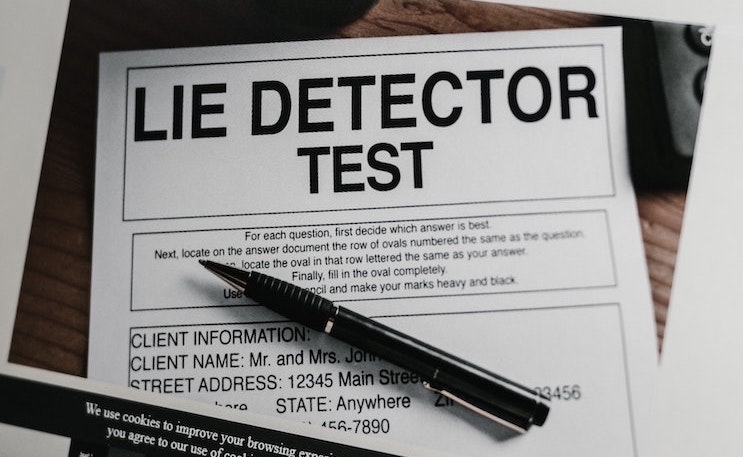10 Ways To Tell If Someone Is Lying To You On The Phone
Extract from my best-selling, literally mind-blowing "Expert Lie Detector" PhD Thesis

We’ve all been there. Whether it’s an employee who calls in sick, a partner who says they didn’t have a holiday fling, or a teenager fabricating their whereabouts, how can you really tell if you’re being taken for a mug?
When people lie to your face, there are widely recognised body language signs that can give them away. But to detect cock-and-bull stories during a phone conversation, you need to watch out for different, more subtle audio signals.
And you would be well-advised to hone that spider-sense porky-pie-detector, since it seems people lie through their teeth on the blower more often than we may think.
A survey of 1,000 UK taxi drivers found that 45% of cab drivers had overheard passengers telling barefaced lies about their whereabouts on the phone. Scary stuff!
So, without any further waffle, here are 10 ways to tell if someone is hoodwinking you on the phone.
1. Repeating words and phrases, or stammering.
If you know the person on the other end of the line pretty well, and you know they don’t usually stammer or repeat themselves often, then when they start to do this, there’s a good chance they are concocting a falsehood.
When attempting to make up a lie on the spot, people often stammer to buy themselves more thinking time.
Additionally, when a person attempts to convince someone of something they know to be untrue, they tend to emphasise and repeat certain words and phrases.
For example, repeatedly using the word, “well” at the start of a sentence can signify that a liar is preparing you for an answer they think will be different to what you’re expecting.
2. Unnatural pauses
Abnormally long pauses before answering a question can also indicate that someone is being less than honest with you.
Lying is a complicated business, and it can be difficult for the liar to recall what they have already said, so unusual pauses can indicate that someone is trying to think of something convincing to say next.
3. Throat clearing
Lying can be stressful, and when people are actively engaged in speaking untruths out loud, their bodies will often react by releasing fight or flight stress hormones.
One potential aspect of this physical response is a dry throat. The moisture that is usually present in our mouths can suddenly dry up, and for this reason a liar will often need to clear their throat or swallow hard before speaking.

4. Ums and Ers
Somebody who inserts a lot of “ums” and “ers” into their end of the conversation could well be telling porkies. Just like pauses and stammers, these meaningless vocal fillers can buy a liar a few more seconds to get their story straight.
To be completely fair though, many people do this when they’re not lying too, so although “ums” and “ers” are not hugely reliable indicators, they may be relevant when detected in combination with one or more of the other audio cues on this list.
5. Convoluted stories
When conversing with someone who is lying, a question to which a brief, concise response would normally be expected will often be abandoned in favour of a convoluted story with a detailed narrative arc.
This technique is used as an attempt to convince the questioner, by distracting them with unnecessary information and complicated explanations.
However, this misguided belief that a long-winded answer will be more convincing often backfires on the liar, as all the finer details begin to unravel further down the line.
6. Manipulative flattery or sudden hostility
People who lie will often try to confuse you by switching their demeanour suddenly and unexpectedly to provoke an emotional response.
For example, by flattering or complimenting the person on the other end of the phone, a manipulative liar can deflect the conversation away from themselves, whilst making the other person feel more sympathetic towards them, and more likely to believe what they say.
Similarly, a person who suddenly turns hostile during a conversation – particularly if they also start using defensive language – knows that this tends to unsettle and upset the person they’re talking to. People experiencing confusion and emotional turmoil tend to lose their train of thought, meaning that the lie gets glossed over and the original issue is forgotten.
7. Changing the subject
This is a very common technique, usually used to deflect attention away from whatever thorny issue a person feels the need to lie about.
Many liars hope that by driving the conversation out of the field of deception, and onto safer territory, the person they’re conversing with will forget about the issue altogether. If this doesn’t work, changing the subject can also operate as a delaying tactic, giving the liar more time to concoct a convincing story.
8. Excessive superlatives
When someone litters their conversation with superlative adverbs such as “completely”, “absolutely”, “totally”, and “literally”, be on your guard.
People who lie often resort to these types of words unconsciously when lying, but they tend to proffer these exaggerated responses in an attempt to sound more convincing.

9. Repeating your questions back to you
Another detectable tool in a liar’s arsenal, repeating someone’s questions back to them buys a few more valuable seconds of thinking time.
It can also help the liar to gauge how much the other person already knows, so that they can tailor their responses accordingly.
10. Qualifying truthfulness with exaggerated phrases
If someone feels the need to emphasise that what they’re saying is totally truthful, then they may be lying.
For example, phrases such as “to be perfectly honest”, “I swear”, “in all honesty”, and “if I’m being completely truthful” can be red flags for lie detectors.
Summing up
So, there you have it. You should now be well-positioned to detect when someone is attempting to pull the wool over your eyes during a telephone conversation, or indeed other situations where visual cues aren’t available.
In fact, to be perfectly honest, this is literally THE most definitive guide on the topic of lying you will ever find.
What’s that you say? What makes me an expert on the subject?
Well… my expertise actually stems from the fact that I did a PhD in lie detection in, er, 1990 and, um … actually, that was a funny year. I was in Sheffield at the time, and, if I’m being completely truthful, I was out of my depth. I had just met this guy who was starting a llama farm on the outskirts of the city. Anyway, I was there one day when the first consignment of baby llamas were delivered. They were so cute! I mean, really, really cute! Actually, I bet you’re an animal lover yourself – I always imagined you as one of those people who would end up rescuing animals in distress or something. Must be because of your kind and caring nature …
What’s that you ask? Do I really have a PhD?
Why the hell do you need to ask me that? Seriously, why are you asking me that? Are you questioning my ability and intelligence? You literally don’t know anything about me. I think it’s about time we ended this conversation. I’m off …




